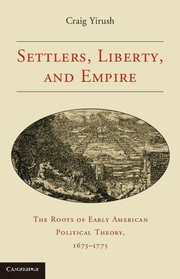Introduction
Jasper Maudit's “Instructions”: The Imperial Roots of Early American Political Theory
Published online by Cambridge University Press: 05 June 2012
Summary
In June 1762, in the waning months of the Seven Years' War, the Massachusetts General Court sent Jasper Maudit, its new agent in London, a lengthy set of “instructions.” Maudit, a London merchant and dissenter, had taken up his appointment at an auspicious time. The colony had been informed by the previous agent, William Bollan, that the Crown was going to require the insertion of a suspending clause in all future laws, ensuring that they would not take effect until approved by the Privy Council. In Bollan's view, this interference with Massachusetts' legislative authority underlined the long-standing need “for a thorough Examination” “of the Original, inherent and just Title of the Colonies in America to the Rights, Liberties and Benefits of the State, whereof they were Members.”
Taking Bollan's warning seriously, the colony's “instructions” to Maudit laid out a comprehensive account of the rights of the British American settlers in the empire, one that reveals to the modern reader the contours of a lost world of early American political theory, stretching back to before the Glorious Revolution, while anticipating the revolutionary arguments that would convulse the British Atlantic world in the decade to come.
At the heart of the colony's case was a claim that “The natural Rights of the Colonists” were “the same with those of all other British subjects, and indeed of all Mankind.” In support of this claim, Maudit's instructions drew on Locke's Second Treatise.
- Type
- Chapter
- Information
- Settlers, Liberty, and EmpireThe Roots of Early American Political Theory, 1675–1775, pp. 1 - 26Publisher: Cambridge University PressPrint publication year: 2011



